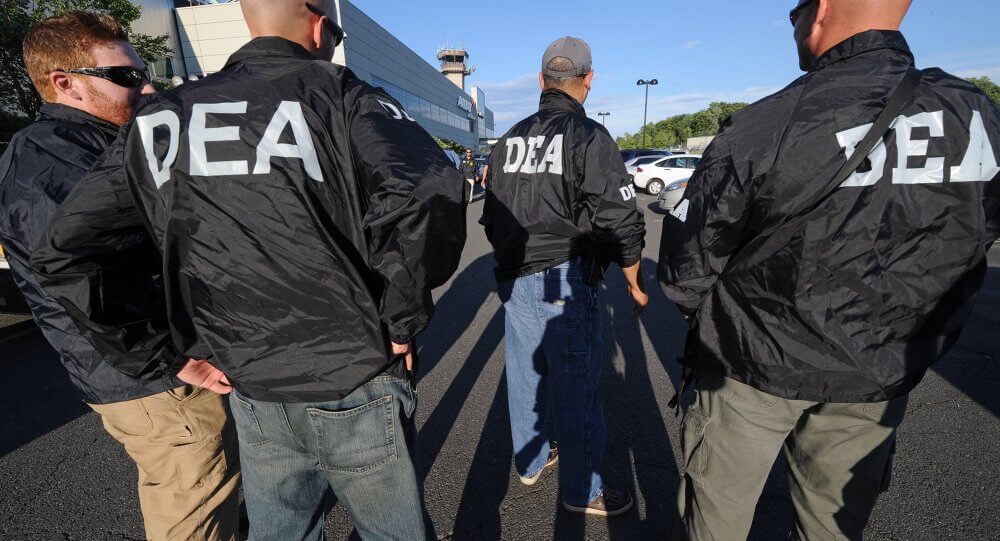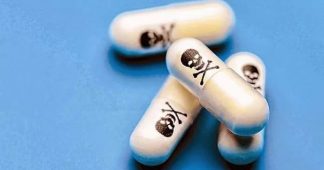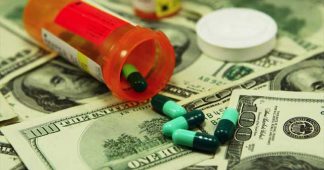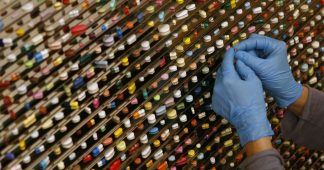By Ellen Teague
April 28 2006
THE CONSTANT GARDENER, based on a novel by John Le Carré, was a prominent film at the Oscar ceremony in March. A love story, where the wife of a British diplomat is killed in Kenya and he investigates the circumstances, the film also explores the world of global pharmaceuticals. She had been a feisty activist who uncovered a conspiracy by a pharmacy company to test experimental drugs on the poor in Africa. She then tried to expose the conspiracy until she was brutally murdered. Her husband then seeks justice for his wife while trying to uncover the hard truth of what is going on. The diplomat finds himself in a murky web of exploitation, involving Kenyan corruption and a major pharmaceutical company eager to promote its ‘wonder cure’ for tuberculosis.
The film has raised important questions. Does big business experiment on the poor as the film suggests? As the drug companies pour AIDS drugs into Africa, are they testing other drugs too? How far does profit override humanitarian concerns? ‘No drug company does something for nothing,’ Le Carré has a character observe in his story, and a postscript from him at the end of his book reads, ‘Nobody in this story, and no outfit or corporation, thank God, is based upon an actual person or outfit in the real world. But I can tell you this; as my journey through the pharmaceutical jungle progressed, I came to realise that, by comparison with the reality, my story was as tame as a holiday postcard.’ So, what is the chilling truth underpinning the pharmaceuticals business?
Drug trials
According to a May 16, 2005 report in USA Today, the big drug companies are indeed outsourcing increasing numbers of drug trials outside the United States and Europe. In Merck’s case it is now 50 percent and Wyeth Pharmaceuticals will be 70 percent by 2006. Across Latin America, Eastern Europe, Asia and Africa, the sick are abundant and desperate, and so recruitment into clinical trials there is brisk. Yet, as the film makes clear, the guinea pigs in the developing world only rarely enjoy the benefits of the research they participate in.
Sometimes the new drugs are unlicensed in their countries or priced out of reach, but more often the drugs are irrelevant to the medical needs there. After all, 90 percent of the global medical research budget is geared towards illnesses that cause just 10 percent of the world’s disease burden. And so, while 500 million cases of malaria rage across the developing world, the working poor of India, South Africa and elsewhere, desperate for the kind of high-tech care available to them almost solely through clinical research, line up for experimental doses of the latest arthritis, heart disease and obesity drugs. Of the thousands of new compounds drug companies have brought to the market in recent years, fewer than one percent have been for tropical diseases. Emphasis is on profitable research and cures for problems such as impotence, baldness, and aging, which affect those who can afford to pay for the drugs.
There is evidence too of ethical lapses. In one inquiry, out of 33 subjects enrolled in an experimental trial in Thailand, all of whom had signed forms stating their informed consent, 30 were found to have been misinformed. The experimental HIV vaccine they were about to receive had no known protective value, but the subjects thought it would, in fact, protect them from the deadly virus.
Dissenting voices
In the film, Tessa Quayle, the murdered activist, makes public criticism of the drug companies. She loudly embarrasses a health minister, who storms off. Yet, the reality is that such campaigners rarely enjoy this kind of privileged access to power. Also, in real life, bad drugs and unethical research practices often continue unhindered despite mountains of data and reports detailing their defects. Experimental practices that would be condemned as unethical in the West – including placebo trials among ailing AIDS patients – are frequently used in countries of the South. In the film, the trial’s results are so dangerous that they must be suppressed by an international conspiracy of corporate executives and state authorities. In reality, most of the time new drugs aren’t uniformly deadly. Rather, new drugs do work, just not very well, or not for everyone, or not without side effects or, most frequently, not any better than older, safer drugs. What that means is that challenging unethical trials is complex and daunting, and those who do it certainly put their jobs and careers on the line.
Clearly, the business of testing experimental drugs in humans carries some risk. On average, every American buys more than ten prescription drugs every year, and they want adequate testing to have been carried out. If that testing involves the poor in the South and millions of animals then most people appear to feel that this is a necessary risk and there is little outcry about it. Of course, campaigners highlighting the unethical practices of pharmaceutical companies will say that the vulnerable should be protected from this kind of predatory relationship with the corporate world.
Corporate power
Mega-mergers of pharmaceutical companies in recent years have given then enormous power. The combined worth of the world’s top five drug companies is twice the combined gross national product of all sub-Saharan Africa. Their influence on the rules of world trade is many times stronger because they can bring their wealth to bear directly on the levers of western power.
The pharmaceutical industry is one of the most profitable industries in both the United States and Europe. The global drugs market is controlled by corporate behemoths such as Pfizer, Bristol-Myers Squibb, Bayer, Merck & Co, Pharmacia, Novartis, Johnson&Johnson, Abbott Laboratories, American Home Products, Eli Lilly, Schering-Plough, GlaxoSmithKline and Allergan. Their market domination enables them to dictate drug prices. In recent years, pharmaceutical prices have risen faster than the rate of inflation. A patient will not change the demand for a product with a small change in price when there are no close or available substitutes. Actual manufacturing costs of medicines are relatively low. The big pharmaceutical companies’ profits can be even higher due to limited competition in the pharmaceutical industry caused by strict patent laws, whereby a company owns a patent for a key drug. They are also increasingly buying into biotechnology companies in expectation of increasing profits there. Bio-prospecting in biodiverse-rich countries of the South is another cause for concern, where rich pickings are made using plants nurtured by local communities for many generations.
The Common Good
Pharmaceutical companies have created life-saving drugs that have saved millions of lives, but they have also participated in practices around the world that have come under mounting criticism. An apartheid of pharmacology means that the companies neglect the diseases of the tropics which afflict the poor. In 1995, for example, pharmaceutical giant Aventis stopped producing the only safe medicine for the late, fatal stage of sleeping sickness, which affects half a million people in 36 African countries. They couldn’t make any profit from it. In 2000, Bristol Myers Squibb used the drug for profitable purposes in the West as an ingredient in hair-removing cream, under license from Aventis. Public opinion, however, has brought pressure for change in the direction of upholding the common good as an imperative for developing and making treatments available. In 2001, 39 leading pharmaceutical companies dropped a court challenge to prevent the South African government from importing, manufacturing or licensing cheap copies of their patented medicines – including AIDS drugs. This legal landmark was seen as a breakthrough in getting treatment to millions of people living with HIV/AIDS in South Africa and other developing countries.
Pushing life & death
The issue of human trials being carried out without permission in the developing world, far away from scrutiny of European or American authorities, is another key concern which has now been made more visible in a high profile film. Pharmaceuticals are a commodity, but they are a commodity that you may be forced to take to save your life, and that gives them altogether a deeper significance. In the words of one doctor who spoke out against unethical trials, the companies ‘have to realise that they’re not just pushing pills, they’re pushing life or death, and I believe that they don’t always remember that’.
A BITTER PILL
In 1996 Kano, a city in northern Nigeria, was suffering from outbreaks of cholera and measles when a third, even more deadly, disease arrived: meningitis. The infection spread quickly through the cramped slums of the city and within weeks thousands of children were ill. The outbreak was not reported in the West but it did not go unnoticed. An internet message alerted scientists at the research headquarters in Connecticut, of one of the world’s biggest drug companies: Pfizer. The company reacted swiftly. It chartered a plane to Kano with a new drug, Trovan, that was a potential life-saver and a potential billion-dollar profit earner. But Trovan had never been tested on children.
The Infectious Diseases Hospital in Kano was full of desperate parents who brought their dying children begging for help. One of these was Mohammed, the father of Anas, who says his son was given a drug by ‘a doctor from overseas’ and put to bed. In a 2001 court case, Mohammed and other parents accused Pfizer of using the epidemic as an opportunity to conduct biomedical research experiments on Nigerian children, instead of using safe and effective bacterial meningitis treatments. They claimed that Pfizer failed to explain to the parents of 100 children that the proposed treatment was experimental, that they could refuse it, or that other groups, such as Médicins Sans Frontiéres (Doctors Without Borders), offered more conventional treatments at the same site free of charge.
Several (the exact number is disputed) of the sick children given the experimental drug died. Many more suffered lasting injuries from their infections. It is not known if they could have been saved had they been on the other more standard treatment that organisations like Médicins Sans Frontiéres were already helping with, but it is standard practice to change treatment if a patient is not responding to one treatment when their life is on the line. Pfizer doctors did not do this. One of the most damning pieces of evidence against Pfizer was a letter sent to the Pfizer chairman, by the company’s own childhood disease specialist, Dr. Juan Walterspiel, protesting in the strongest possible terms about the trial. The letter detailed eight major objections, including that the drug was not tested against this particular form of meningitis. The letter also referred to the lack of consent forms. As a result of this letter, the company sacked him.
Updated on October 06 2016
Published at http://www.messengersaintanthony.com/content/pharmaceutical-jungle
Also read











